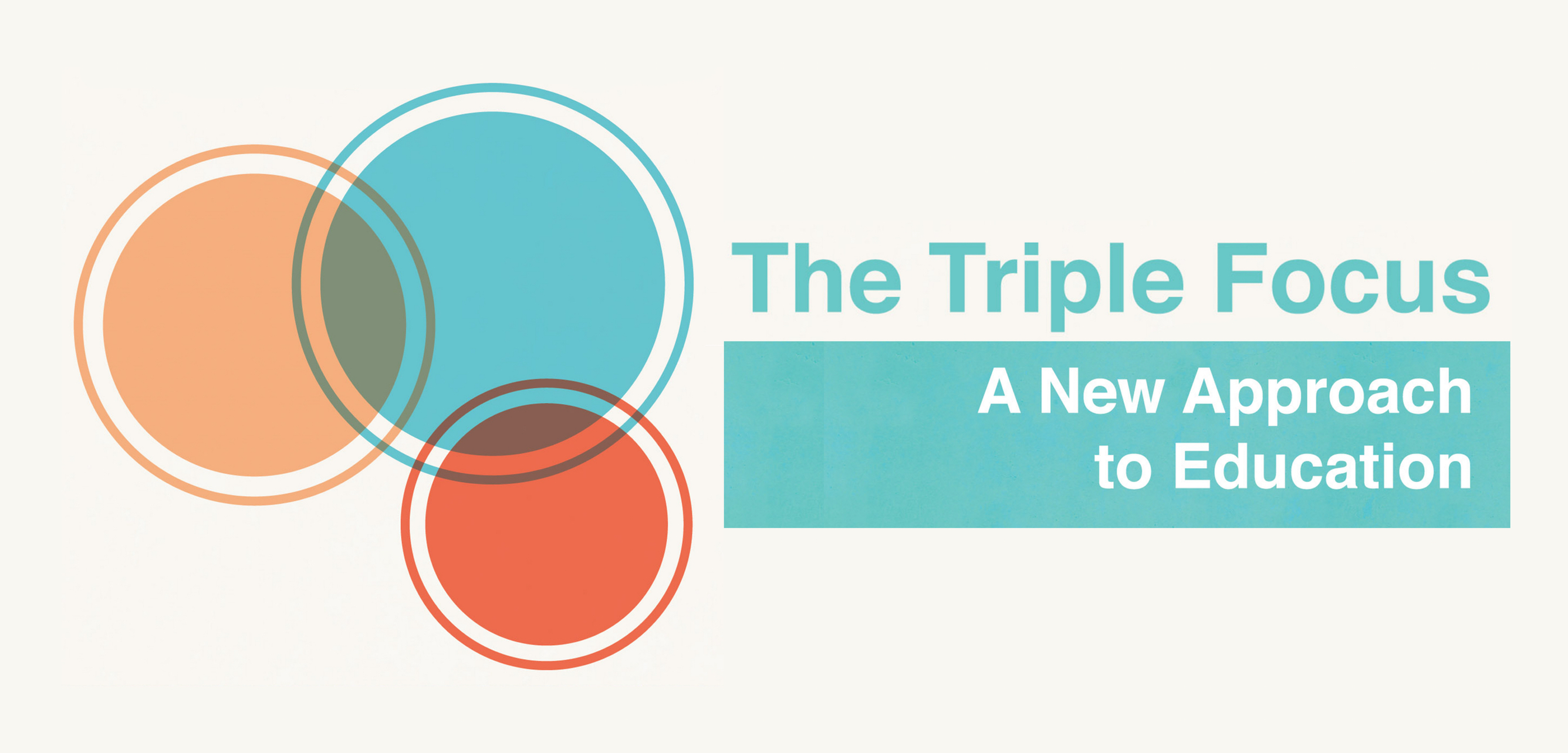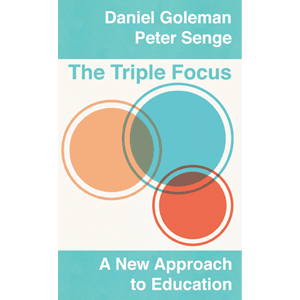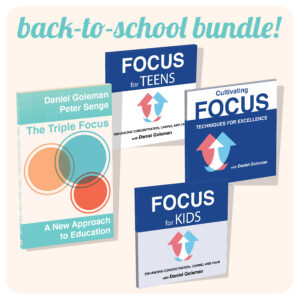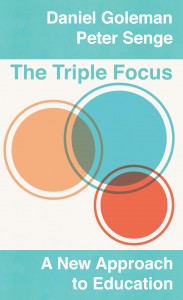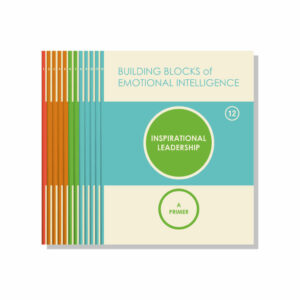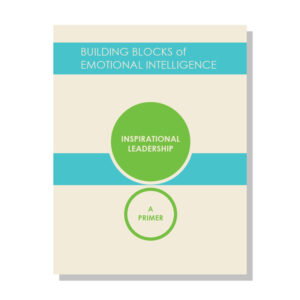
On Tuesday, January 28, Daniel Goleman hosted a live Q&A on Facebook for his latest book Focus: The Hidden Driver of Excellence, and his CDs Cultivating Focus: Techniques for Excellence, and Focus for Kids and Focus for Teens. Below is a recap of the exchange.
Q: I’m curious how to balance the three types of focus in the fast-paced high tech world. It seems there are fewer and fewer spaces for having a focused, connected conversation that embraces empathy and compassion.
A: Good question. The faster the pace, the bigger the challenge. It does take a bit of non-goal focused time to tune in and connect with the other person. You may not be able to do this on every phone call, but it’s worth doing at some point during the day or week, especially with people you work with continuously. A genuine connection, one with mutual empathy and interest creates a better container for communication when the pressure is high. You might find this article helpful > Focus on how you connect
Q: I am currently working on a venture to help students focus on school work (through the use of mindfulness and creating focused environments for doing school work). I noticed you have several teen podcasts. How do you recommend teaching these to young students? I know that young adults are beginning to realize the importance of mindfulness for daily life, but what is the best way to approach this with elementary/ high-school students?
A: I’m thrilled to hear that you’re doing this. I think it’s important to understand that young people can learn to improve their focus, and that this also makes them more ready to learn. This seems a logical next step to add to curriculum in schools everywhere. I think it’s important to do this in an age-appropriate way. I’ve seen second graders in Spanish Harlem lie on the floor with their favorite stuffed animal on their tummy, and watch it rise on the in breath, counting 1, 2, 3…, and same on the out breath. Five minutes of this made the classroom calmer and more focused for the rest of the day. I know teens who have actually gone on retreats, and done this much of the day. The benefits are very real at the brain level, shifting moods toward the positive, enhancing concentration, and speeding recovery from stress arousal. Here’s an Edutopia video about “Breathing Buddies.”
Q: Why do we see so much variation in kids’ ability (or lack of) to manage those three types? Nature vs. nurture?
A: Our ability to focus on ourselves, on other people, or on the world at large, is a combination of nature and nurture, but mostly nurture. For instance, kids with ADHD may get that label because adults don’t realize that the attention circuitry of the brain continues to develop from birth to the mid-20s. Adults think seven-year-old kids should act like 12-year-olds, and give them the diagnosis on ADD. However, teaching kids to focus and getting them to practice focusing can help them concentrate when they need to. But schools don’t do this. They expect kids to have the skill. We should nurture these abilities in children by helping them along. Here’s a sample track from my Focus for Teens CD.
Q: What is the relationship between focus and grit?
A: Grit is the term psychologist Angela Duckworth uses for the ability to keep your focus on long term goals and strive for them despite setbacks. The ability to focus is the center this capacity. Cognitive control, being able to focus on one thing that’s important and ignore distractions, is essential to every step toward that larger goal. Both grit and cognitive control can be classified as self-regulation, which is a major part of emotional intelligence. This article might be of interest to you > How children learn self-control
Q: (Question from Dan Goleman to the group): Does anyone have a manager with empathy deficit disorder? (Participant response): I have had a few, very smart, but also very driven by his own needs. I survived being fired by focusing on what they did right, but staying silent when I didn’t agree. Not easy while trying to keep my sense of honor alive and well.
A: Sorry to hear about your bad bosses. The best ones pay attention to the feelings and needs of direct reports in a fashion that’s like good parenting. This lets people feel secure enough to take smart risks, to innovate, to be creative. This leadership style has great return for companies. Learn more about this in my discussion with George Kohlrieser.
Q: What is the main obstacle to focus?
A: There are two obstacles to focus. Both of which have to do with how we manage our inner world. First: emotional distractions. These are the things in our lives, often relationships, that trouble us, but we can’t stop thinking about. Rumination is the most powerful distraction. On the other hand, thinking them through, and let the worry go is a good thing. Second: mindlessness. Our mind wanders and loses focus. The good news, mindfulness can be strengthened like a muscle. We can develop a habit of monitoring our attention and bring it back to what’s most important. Read more about this concept here > The two biggest distractions – and how to avoid them
Q: What’s the connection between focus and discipline?
A: Another word for self-discipline is cognitive control, a term neuroscientists use for the ability to hold our attention on the one thing that’s important in the moment, and let our distractions go. For instance, do your homework before getting to the Xbox. This is sometimes called impulse control. This ability has been found to predict a child’s financial success and health in her 30s better than IQ, and better than wealth of the family she grew up in. This article might be helpful > How focus changed my thinking about emotional intelligence
Additional resources about focus:
PODCASTS
Focus and education
Focus and leadership
Focus and everyday life
Daniel Goleman on The Diane Rehm Show
Sample Focus for Teens track
Sample Cultivating Focus for adults track
VIDEOS
Daniel Goleman’s Google Talk on Focus
Daniel Goleman on HuffPost Live
Parents teach focus
The importance of downtime
Breathing buddies
Three kinds of focus
Attention is like a muscle
Focus, flow and frazzle
Focus and compassion
ARTICLES
Cultivating a focused workplace
Organizational attention deficit disorder
Perfect practice makes perfect
Leader’s empathy deficit disorder
Focus on how you connect
Attention and creativity
Systems blindness
The two biggest distractions – and how to avoid them
The focused leader
Three types of focus
How children learn self-control
Cognitive control online
Benefits of a productive cocoon
Attention regulates emotion
Focus and emotional intelligence
Four basic moves to strengthen focus
Mindful.org Q&A
Special bundle package: Save 25% when you buy Focus: The Hidden Driver of Excellence and Cultivating Focus: Techniques for Excellence.

